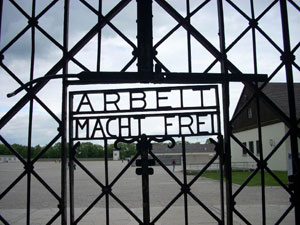
Translated, the gate reads: "Work Shall Set You Free." Photo by Karen Marcotte
Some of Summer 2009's Study Abroad students and faculty got an up-close and very personal look at the somber sites and sounds of the Holocaust in Europe.
This Study Abroad consisted of 25 students and 11 faculty and community members. Students prepared for the experience by meeting throughout the spring semester of 2009 before beginning their journey during Maymester, when they took HIST 1302, U.S. History II; HUMA 1302, a special topics course dedicated to The Holocaust; and/or EDTC 1325, Multicultural Education.
The group embarked on a two-week journey to continue their studies from May 17 to May 30 through Germany, Poland and the Czech Republic. This Study Abroad included cities such as Berlin, Munich, Warsaw, Krakow and Prague.
"Since our Study Abroad was based on the Holocaust in Europe, we visited places that had direct relation with that," said student Stephanie McElhatten, an Elementary Education major.
The countries visited were for each student's benefit to completely grasp the history that had only been read about in textbooks. Events in history became the scenes before each traveler.
The after-effects of arrival, commonly known as jet-lag, didn't keep the group from their studies. Over a span of four days, their journey began in Berlin, Germany, with a visit to a Jewish Museum and a section of the Berlin Wall.
However, it was the visit to the Wannsee Conference House that struck both students and professors hard. Many students were taken aback by what they learned.
"This was the place where the final solution was decided upon, which ended in the murder of millions of Jews," said McElhatten.
Their journey continued by train the next morning on May 21 to Poland. This gave students' and professors' minds a rest, but focus was quickly regained as they made their way into Warsaw.
Tour guides were available to show students the scattered remains of the Warsaw Ghetto and to provide them with videos and artifacts about the destruction of the Jewish people.
"On May 23, we left by bus for Krakow, Poland…This was the day we had been looking forward to and dreading. We went to the extermination camps of Auschwitz and Birkeneau," said Karen Marcotte, professor of History and Humanities.
Many of us have studied or at least have an idea of the genocide that took place at Auschwitz. Genocide is the intended destruction of an ethnic group.
Student Lily Davalos, a Nursing major, painted a solemn picture. She said, "The moment I passed the gates where the train stopped, something hit me and I felt the pain... Suitcases from men and women remained with the names and addresses still attached, along with toothbrushes, shoes, hair and even baby clothes…We had no idea walking into the gas chamber would be so hard. From seeing this, I broke down in tears."
Moved by such shocking scenes, the students and professors lit candles at memorial sites and bowed their heads for those who had suffered such painful ordeals.
Robert Hines, professor of History said, "It's almost like it's a spiritual site of remembrance and not so much a museum or a monument. You feel so many things when you're right there."
The tour guides called it a day to relieve the dark clouds that hung over students' and professors' heads. The group spent the rest of the afternoon exploring the town of Krakow and enjoying their lunches, which consisted mostly of sausage. This allowed time for everyone to reflect on their experiences.
Prague in the Czech Republic, was the last stop on the tour. The group visited a few more museums and had discussions about the history they encountered while on their journey.
"I planned this trip to enable students to experience the Holocaust. I wanted them to know why it occurred, what it did to people and nations, and to hopefully understand how it could be prevented," said Marcotte.
Study Abroads play an important role in a student's education. Price may be an obstacle, but it isn't a barrier. Scholarships from the Alamo Colleges' Office of International Education are available to students who may need a little help to pay for the experience.
For Summer I 2010, Palo Alto Students will Study Abroad in Ireland. For more information, contact Dr. Theresa Garfield-Dorel at (210) 486-3043 or e-mail her at tgarfield@alamo.edu. You may also contact Professor Robert Hines at (210) 486-3146; his e-mail is hinesrob@yahoo.com.